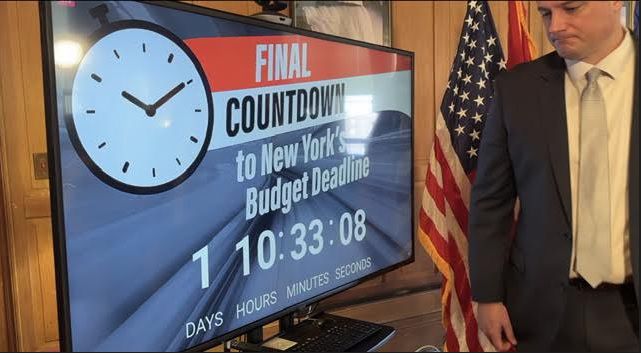Disagreements over changes to New York's controversial bail law, as well as how to expand housing in the state, are fueling what is expected to result in a state budget that blows through Saturday's deadline, state lawmakers acknowledged on Thursday.
Gov. Kathy Hochul has pointed to her proposed changes to the state's bail law as well as her housing plan as key issues for her in the budget talks.
Democratic lawmakers who control the state Senate and Assembly have not publicly embraced the bail law plan that would end the "least restrictive" standard for when judges determine bail for serious crimes. Hochul's housing proposal — meant to spur the construction of 800,000 units of housing in the state in the next decade — have also been decried by suburban officials.
Hochul in an interview with New York Public Radio on Thursday said she expects not to meet the budget deadline.
"It's becoming clear that the budget will not be meeting the April 1 deadline," Hochul told New York Public Radio's Karen DeWitt. "But as I have said all along, it's not about a race to the deadline, it's about a race to getting the right results."
Budget talks have also centered around a potential income tax rate increase on New Yorkers who earn more than $5 million a year, an increase in the state's minimum wage while also linking it to inflation going forward and an expansion of charter schools primarily in New York City.
Hochul's housing plan has drawn concerns, meanwhile, from progressive advocates who want to make it harder for landlords to raise rents and evict tenants. Democratic lawmakers have called for more rental assitance for low-income New Yorkers.
The governor's housing plan itself seeks to boost infrastructure for water and sewer while also allowing the state to prioritize housing projects even if they do not meet local approval.
Late budgets had been a hallmark for decades in Albany until Gov. Andrew Cuomo's tenure. Cuomo placed a premium on meeting the April 1 deadline, when New York's fiscal year begins.
Hochul has placed less emphasis on a budget by then.
Despite being publicly at odds, lawmakers have indicated they are willing to continue negotiating with the governor.
The bail law, approved in 2019 and ended cash bail for many criminal charges, has proved to once again be a flash point. Lawmakers approved a package of changes last year that added more bail-eligible charges.
Senate Majority Leader Andrea Stewart-Cousins told reporters at a news conference that "everything is on the table."
"It is important that we keep the integrity of the law and that we continue to maintain what we have always said: You should not be criminalized because you cannot afford to get out," she said.
Beyond being an incremental development, a late budget gives Hochul potentially more leverage going forward. Governors can include large swaths of their preferred budget plans in emergency spending measures.
Lawmakers must approve an emergency spending measure by the end of the day on Monday in order to fund state employee payroll for more than 55,000 workers. Members of the Legislature themselves will not be paid until the budget is finalized.
Republican Senate Minority Leader Robert Ortt unveiled a livestreamed countdown clock ahead of the April 1 due date.
Ortt on Thursday said he hoped Hochul uses her leverage to enact the bail changes.
"I hope she uses what leverage she has to get a good budget," he said. "The vast majority of New Yorkers on bail want some changes. They want changes to cashless bail. They believe crime is a problem."


